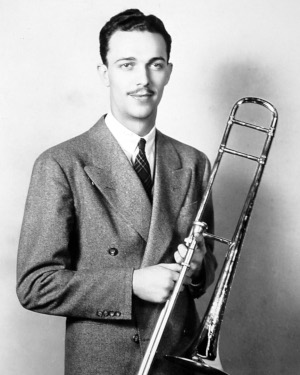Jack Jenney

-
Birth Name
Truman Elliott Jenney -
Born
May 12, 1910
Mason City, Iowa -
Died
December 16, 1945 (age 35)
Los Angeles, CA -
Featured Vocalists
Meredith Blake
Thelma Carpenter
Bonnie Lake
Louise Tobin
During the 1930s, Jack Jenney was a highly sought after trombonist in New York band circles, never lacking for radio and recording work. After playing with such luminaries as Austin Wylie, Isham Jones, Mal Hallett, and Red Norvo, he attempted several times to form a band of his own, but lack of discipline plagued every effort. That same lack of discipline eventually led to health problems which would later claim his life at only 35 years of age.
In early 1937, Jenney led an orchestra to support the Victor recordings of his wife, radio singer Kay Thompson, and in January 1938 he made his first recordings under his own name on the Vocalion label, backed by a pick-up band which included Gene Krupa and Toots Mondello, with Adelaide Moffett singing. In mid-1938, Jenny attempted to organize a permanent band. The group struggled and broke up in early 1939 after Jenney’s agents sued him for breach of contract, having never been paid their commission. The band included young African-American vocalist Thelma Carpenter.
Jenney made another attempt to form his own outfit in mid-1939, this time with slightly better results. The new band debuted in Cincinnati that June and signed a contract with Vocalion in August. Lucille Matthews initially provided vocals, followed by Meredith Blake, who stayed until January 1940, and then Louise Tobin. Frank Bond was male vocalist. Arrangers included sax player Hugo Winterhalter and pianist Frank Cohen. Jenney’s recording of “Stardust” in 1939 is still considered the greatest trombone solo of all-time. Jenney was a very disorganized man, however, and he went far into debt. He disbanded in mid-1940 and worked as part of the house musical staff on CBS and NBC before joining his friend Artie Shaw’s orchestra later that year.
Jenney divorced Thompson in 1939 and married songwriter and vocalist Bonnie Lake in November 1940. Shaw disbanded in early 1941, and Jenney, without income now and still heavily in debt, filed for bankruptcy that summer. Shaw formed a new outfit in August, with Jenney again as a member. Shaw’s vision was to build a 52-piece concert orchestra, but American Federation of Musician rules forced him to scale back to a 32-piece dance band, which included 15 strings. Needing a vocalist, Shaw brought Lake onboard as well. Lake toured with the band and recorded one song, “This Time the Dream’s on Me.” She and Jenney both left Shaw in late September after Jenney suffered a physical collapse.
In early 1942, after a period of rest, Jenney and Lake formed a trio with pianist Lester Ludke, with Lake as vocalist. In early 1943, Jenney made another attempt at leading his own band, taking over Bobby Byrne’s group when Byrne was inducted into the service. On July 1, Lake joined her husband’s orchestra as vocalist during an engagement in Denver. Jenney, as before, was disorganized, and he struggled, finally throwing in the towel in October.[1] He and Lake then settled on the West Coast, and he began working casual dates, hoping to start radio work soon. The Navy had other plans, however, and Jenney was drafted before year’s end.
Soon after his induction, Jenney fell ill with “a fever” and was confined to a Navy hospital for several weeks before being discharged from the service. Returning to civilian life, he continued working as a musician, but incapable of leading a well-disciplined life he developed kidney problems, and on December 16, 1945, Jenney passed away from peritonitis following an appendectomy. During the last year of his life, Lake and Jenney, along with Eddie De Lange wrote the memorable tune “The Man with the Horn,” famously recorded by both Harry James and Boyd Raeburn in 1946.
Notes
Joe Marsala briefly took over the band before Dean Hudson reorganized it in November. ↩︎
Sources
- “Orchestra Notes.” Billboard 17 Apr. 1937: 14.
- “Tooters Usually Ankle Out for a Smoke.” Billboard 12 Feb. 1938: 14.
- “Lawyers Claim Jenneys Violated Contract.” Billboard 28 Jan. 1939: 7.
- “Orchestra Notes.” Billboard 18 Mar. 1939: 12.
- Ebel, Bud. “New Jenney Ork Debuts in Cincy.” Down Beat Jul. 1939: 33.
- “Orchestra Personnels: Jack Jenney.” Down Beat Aug. 1939: 25.
- “Orchestra Notes.” Billboard 9 Sep. 1939: 10.
- Jenney, Jack. “It's an Uncomfortable Spot.” Down Beat 1 Dec. 1939: 2.
- Advertisement. “Show of the Week.” The Bronxville Review-Press [Bronxville, New York] 11 Jan. 1940: 10.
- Advertisement. “Stanley.” Chester Times [Chester, Pennsylvania] 26 Apr. 1940: 4.
- “Jack Jenney Weds Again.” Down Beat 1 Nov. 1940: 1.
- “AFM Dampens Shaw's Concert Ambitions.” Billboard 23 Aug. 1941: 11.
- “Mess of 'Stars' In Shaw Band.” Down Beat 1 Sep. 1941: 23.
- “Jack Jenney Is Bankrupt.” Down Beat 15 Sep. 1941: 13.
- “Artie Shaw's Itinerary for Next 2 Weeks.” Down Beat 15 Sep. 1941: 19.
- “On the Records.” Billboard 18 Oct. 1941: 68.
- “Single Slants: Thelma Carpenter.” Down Beat 1 Oct. 1942: 20.
- “Jack Jenny May Front Byrnes Band.” Billboard 13 Mar. 1943: 20.
- “Strictly Ad Lib.” Down Beat 1 Jul. 1943: 13.
- “Jack Jenney On the Coast.” Down Beat 15 Nov. 1943: 2.
- “Dean Hudson Reorganizes Good Combo.” Down Beat 15 Nov. 1943: 15.
- “Jack Jenney, Poll Winner, Now in Navy.” Down Beat 1 Jan. 1944: 17.
- “Jack Jenney In Navy Hospital.” Down Beat 1 Feb. 1944: 1.
- “Jack Jenney Dies Suddenly.” Down Beat 1 Jan. 1946: 3.